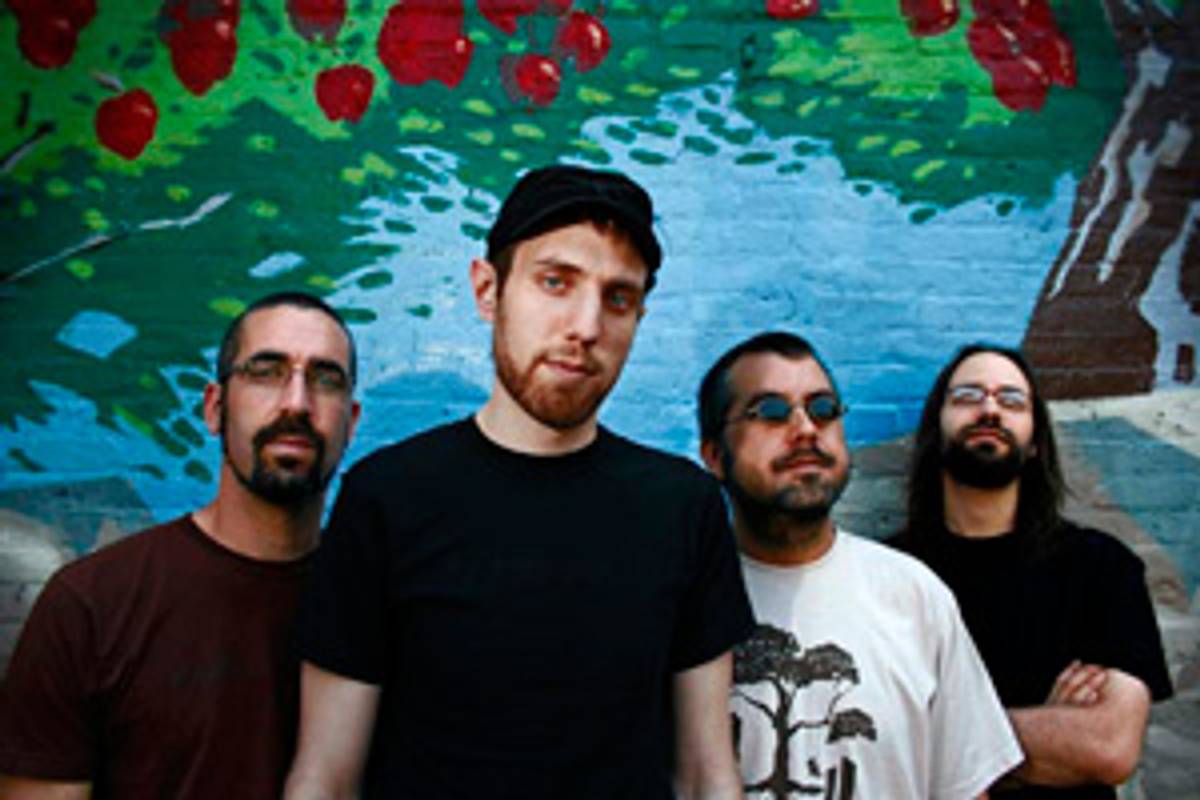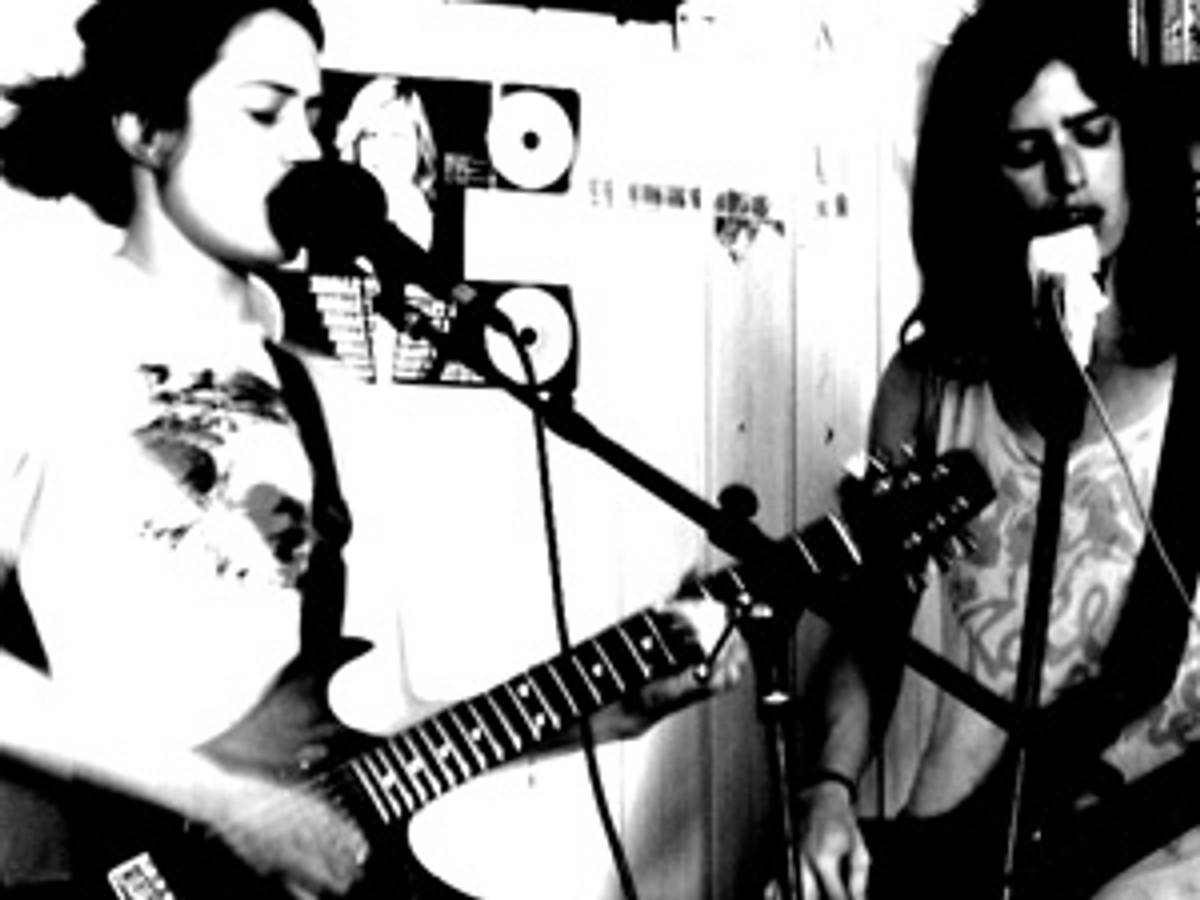Given the numerous scholarly elegies marking the closing of legendary Lower East Side music venues Tonic and CBGB, you’d think punk had been elevated to the status of fine art. Alas, no such luck”both clubs closed because the people who wanted to go there couldn’t afford the cover, and the people who could afford to, and liked to talk about how often they did go, never actually went.
Four years ago, Yoshie Fruchter came to New York and plunged into the avant-garde jazz scene that revolved around those clubs, watching local legends like Shanir Blumenkranz (who can coax just about any sound in the universe from a bass guitar) and multi-instrumentalist percussionist Kevin Zubek work their magic.
Now, they’re both in his backing band.
It’s hard to come up with the right word to describe Fruchter, who fronts the band Pitom, and whose debut record, named for the band, is available this month from John Zorn’s Tzadik Records. The album takes the characteristically absurdist and often improvisational jazz that Tzadik bands are known for and adds more than a measured dose of power-chord punk.

Pitom isn’t a by-the-numbers fusion of jazz and punk, though; it’s more like jazz played on a punk canvas, fueled at one end by the interplay between Fruchter’s guitars and Jeremy Brown’s electric violin, and on the other by a rhythm section of Blumenkrantz and Zubek (who can’t confine themselves to playing rhythm, and often create a whole song-inside-the-song). Uncle Tupelo defined a genre with their mix of punk and country; in ten years, we might be saying the same thing about Pitom.
Listen to “Freigel Rock” by Yoshie Fruchter
* * *
Only a stone’s throw away in influence, but a world apart in content, Tel Aviv’s duo NX2 mix rock and punk and jazz to sound like Portishead without samples, and with an extra helping of lo-fidelity static and chaos. The band”named for its two members, Noga Shalev and Noga Shatz”combines trembling, delicate vocals and guitars shaking with feedback, creating what could easily be mistaken for a soundtrack to either a horror movie or a Gothic romance, but with enough substance and surprise to keep the music squarely at the center of attention. NX2’s six-song E.P. “Dreams on Fire, out from Israel’s Sshaking Recordss, is boundlessly dark, often sad, and almost entirely pretty”it’s what Emily the Strange would play if she were in a band.

For each detour NX2 makes into feedback-entrenched noise (like the latter half of “Feel ) another song springs up that’s simple and strummed. For the most part, the record’s aesthetic is dire and desperate and dirty, like PJ Harvey‘s earliest recordings, the ones that were so scratchy and barren that no one thought she’d ever record again. And then there are songs like “Insideout, where the guitars and vocals are so full and compelling that, like Portishead, they manage to make a tiny two-piece band sound like a whole orchestra.
Listen to “Feel” by NX2
Listen to “Real” by NX2
* * *
Eprhyme‘s recent two-song EP “Punklezmerap was released by K Records, a label more renowned for indie rock (The Moldy Peaches, Modest Mouse) than hip-hop. But Eprhyme (who was known in a previous life as Eden Pearlstein) writes lyrics peppered with bits of Jewish mysticism and philosophy that fit the label’s iconoclastic bent.
As much as I enjoy listening to artists like Kosha Dillz, I can’t help but wonder, would he still be dropping lines about Manischewitz if there wasn’t a more-or-less guaranteed audience? Eprhyme gives hope to those of us in search of something more substantial. He wears his influences on his sleeve, with lyrical and thematic nods to hip-hop groups like A Tribe Called Quest and The Roots, but his flow is entirely his own. In the song “Punkzlemerap, Eprhyme gives a mini-autobiography, playing up his dilettante side (“I’m not the kind of guy to stay too long in one spot/Before hip hop, I
was into punk rock”) while simultaneously striving to connect to something higher (“this is the sound of a different drummer/straight from the mouth of number wonder/613 to keep and remember ).

And when he does employ a Jewish cliché, like lifting a chorus from “Fiddler on the Roof for the song “Where the Heart Is, he isn’t throwing it in blindly. Instead, he twists, wrenches, and squeezes meaning through the different permutations of the song’s verses. “Why must I travel to a distant land/far from the home I love, he sings, echoing both Tevye and an R&B diva. His new work, especially an upcoming project with Shir Feinstein-Feit, promises to dive even deeper; in the song “Shomer Salaam, he chants, “The niglah is the nistar, which literally means that concealed and revealed are the same thing. It’s one of his several hat-tips to Hasidic philosophy, which he’s likely to follow up with a quote from the Koran. It’s a far cry from the bagels-and-lox Judaism of many Jewish hip-hop acts today, and it’s a welcome breath of fresh air.
Listen to “Punklezmerap” by Ephryme
Listen to “Where the Heart Is” by Ephryme
* * *
Diwon the Yemenite DJ recently released his Beat Guide to Yiddish“not a series of language lessons at all, but a 25-minute mixtape, a smokescreen for Diwon to go wild on the turntables and computers. The record is Diwon doing what he does best, which is throwing together all sorts of crazy and obscure samples: Hasidic singer/jester Lipa Shmeltzer, Yiddish boys’ choirs, the requisite 1970s soul songs, and modern songs that sound like 1970s soul songs. Listening, you can’t help but ask yourself, again and again, where did he find that? Not that it matters. Diwon’s sampling feels like Gulliver showing his family the slides from his travels”there’s no way you’ll believe it without seeing for yourself.
* * *
Another notable debut: Ben Bresky, a veritable encyclopedia of all types of Jewish music”he’s the sort of person who can list the last ten people to record versions of “Adon Olam, in klezmer, reggae, and synth-pop variations”recently started podcasting about Jewish religious music for Arutz Sheva, the religious Zionist newspaper in Israel. In his latest episode, Bresky interviewed Aaron Dugan, Matisyahu‘s guitarist, and previewed songs from the latter’s new E.P., “Shattered,” a preview of his album, Light, expected in early 2009.
* * *
If you’re in the New York area, stop by the new 92nd St. Y in Tribeca, where I’m hosting a new monthly music and spoken-word open mic. The first session is Wednesday, November 19, featuring Jeremiah Lockwood from Sway Machinery and Elisa Albert. And if you’ve got a record or a song that needs to be heard, or if you’ve just got something to shout about, drop me a line in the comments.
Matthue Roth is a performance poet and author of the novel Losers. He is an associate editor at MyJewishLearning.com.
Matthue Roth is a performance poet and author of the novel Losers. He is an associate editor at MyJewishLearning.com.